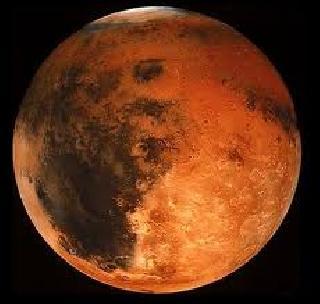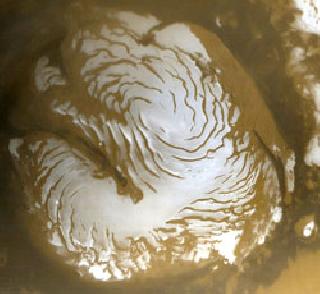
PARIS (AFP): Instead of a warm, wet and possibly life-bearing planet as some scientists contend, early Mars may have been a hostile and volatile place with frequent volcanic outbursts, a study has said.
Earlier research had theorised that certain minerals detected on the surface of the Red Planet indicated the presence of clay formed when water weathered surface rock some 3.7 billion years ago.
This would also have meant the planet was warmer and wetter then, boosting chances that it could have nurtured life forms.
But new research by a team from France and the United States said the minerals, including iron and magnesium, may instead have been deposited by water-rich lava, a mixture of molten and part-molten rock beneath Earth's surface.
Alain Meunier of France's Universite de Poitiers and a team studied clay minerals at Mururoa atoll in French Polynesia that seem similar to Martian examples, and showed they were formed from precipitation of lava.
The same process has also occurred at other locations on Earth, including the Parana basin in Brazil, said the study in Nature Geoscience.
"To crystallise, clays need water but not necessarily liquid water. In other words, clays are not exclusively typical of soils or altered rocks; they may crystallise also directly from magmas," Meunier told AFP by email.
"Magmatic clays have no climatic significance.
Consequently, they cannot be used to prove that the planet was habitable or not during its early history."
If the theory is correct, it "would imply that early Mars may not have been as habitable as previously thought at the time when Earth's life was taking hold," University of Colorado geologist Brian Hynek wrote in a comment.
Two years ago, the same publication carried a study suggesting that a huge, potentially life-giving sea likely covered more than a third of early Mars as single-cell life forms were emerging on our own planet.
The authors of that study said the Red Planet probably had an Earth-like water cycle including precipitation, runoff, cloud formation, ice formation and groundwater accumulation.
Recent probe of our neighbour planet has found no liquid water, though ice has been discovered at the poles. All known life forms need water, so the existence of a water source could point to a haven for primitive life.
 Previous Article
Previous Article Next Article
Next Article













The Indian Air Force, in its flight trials evaluation report submitted before the Defence Ministry l..
view articleAn insight into the Medium Multi-Role Combat Aircraft competition...
view articleSky enthusiasts can now spot the International Space Station (ISS) commanded by Indian-American astr..
view article